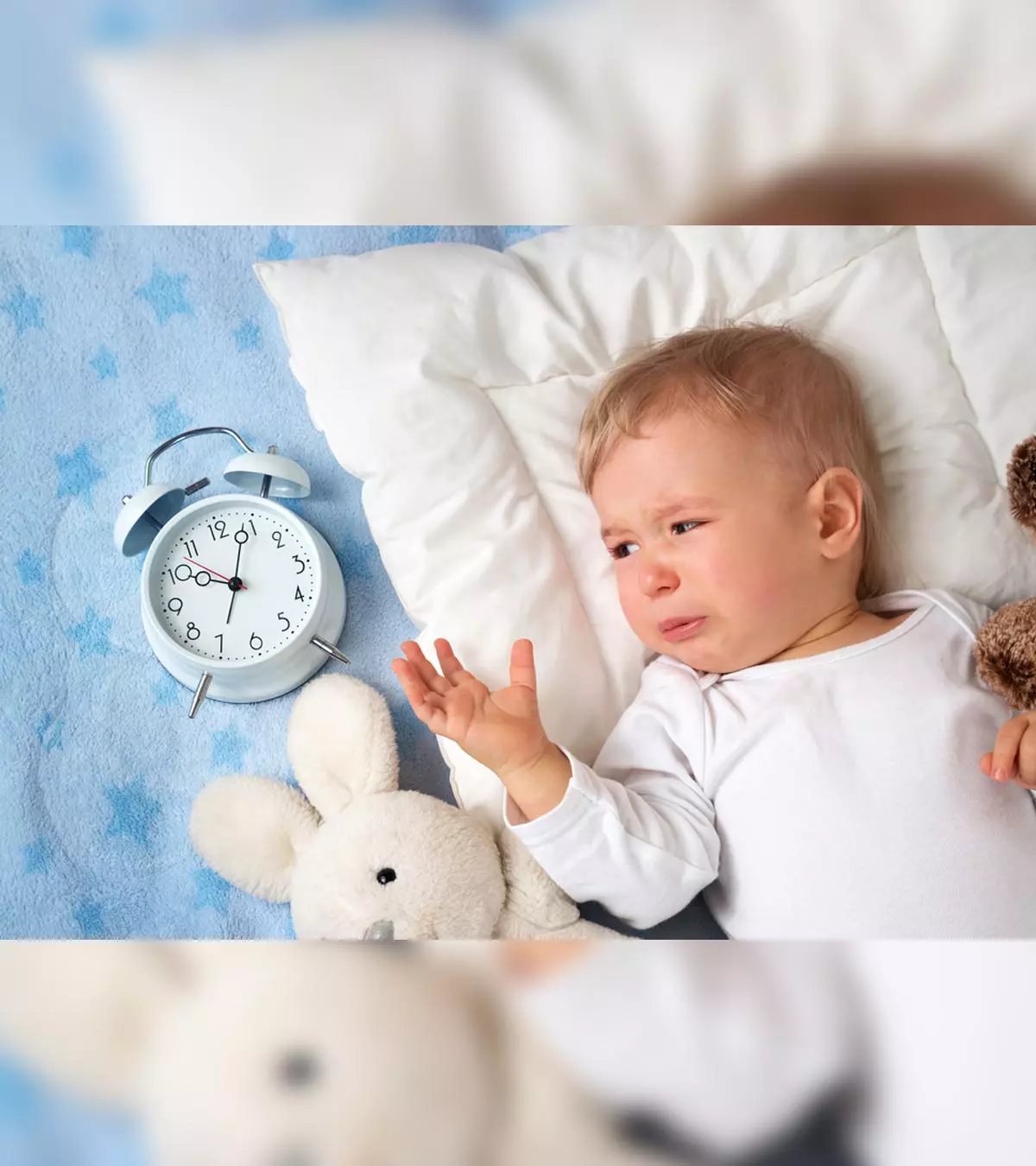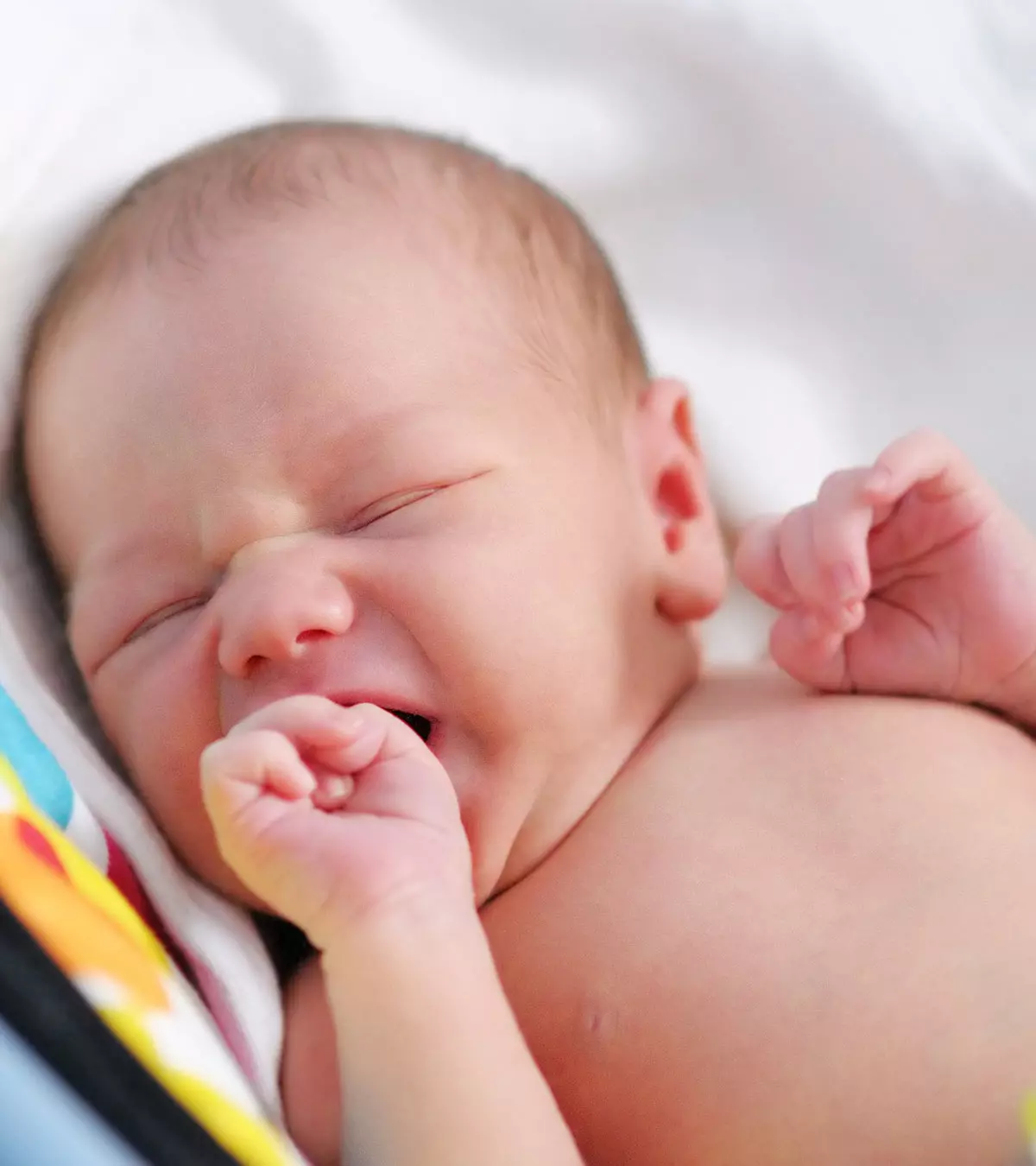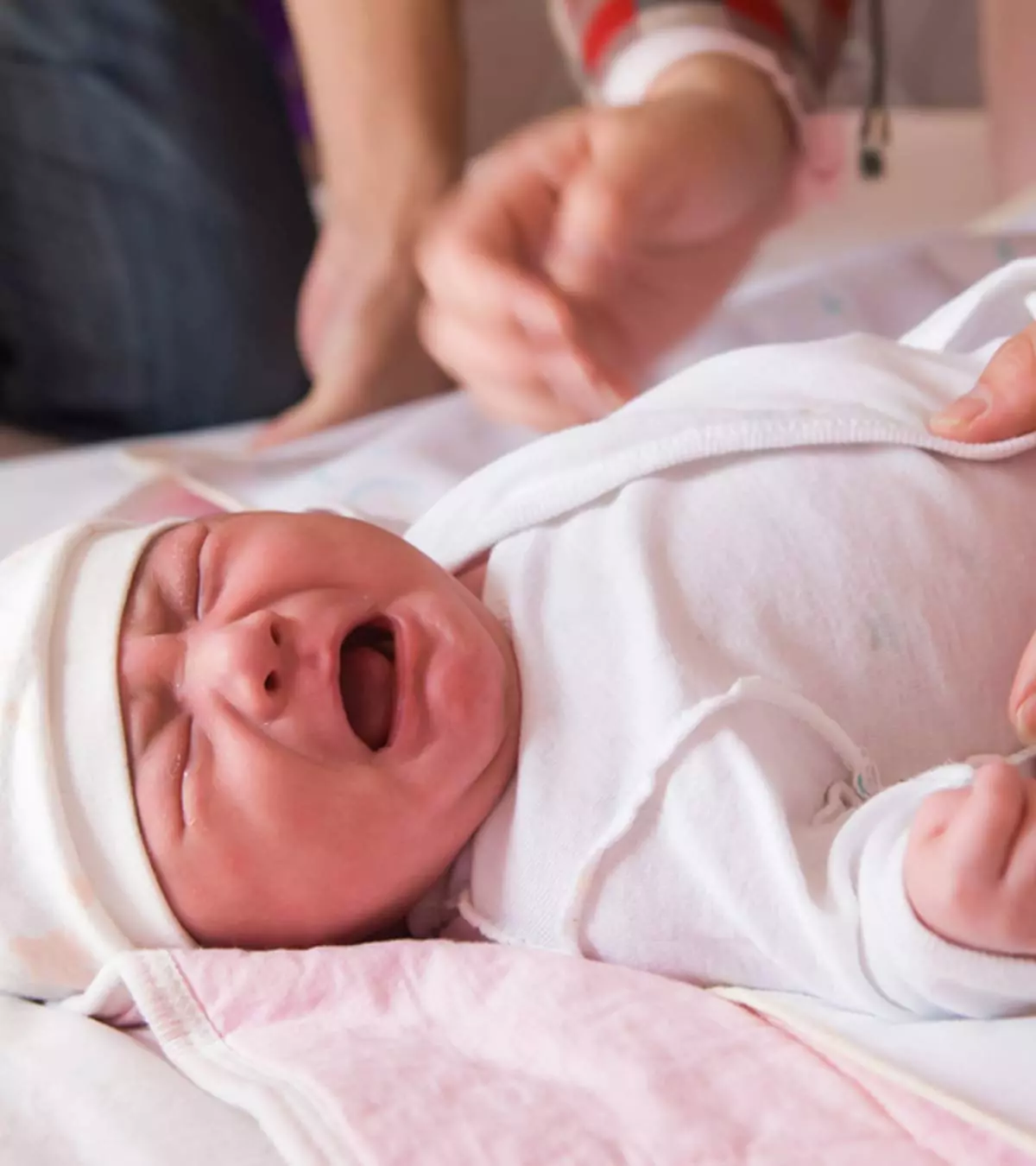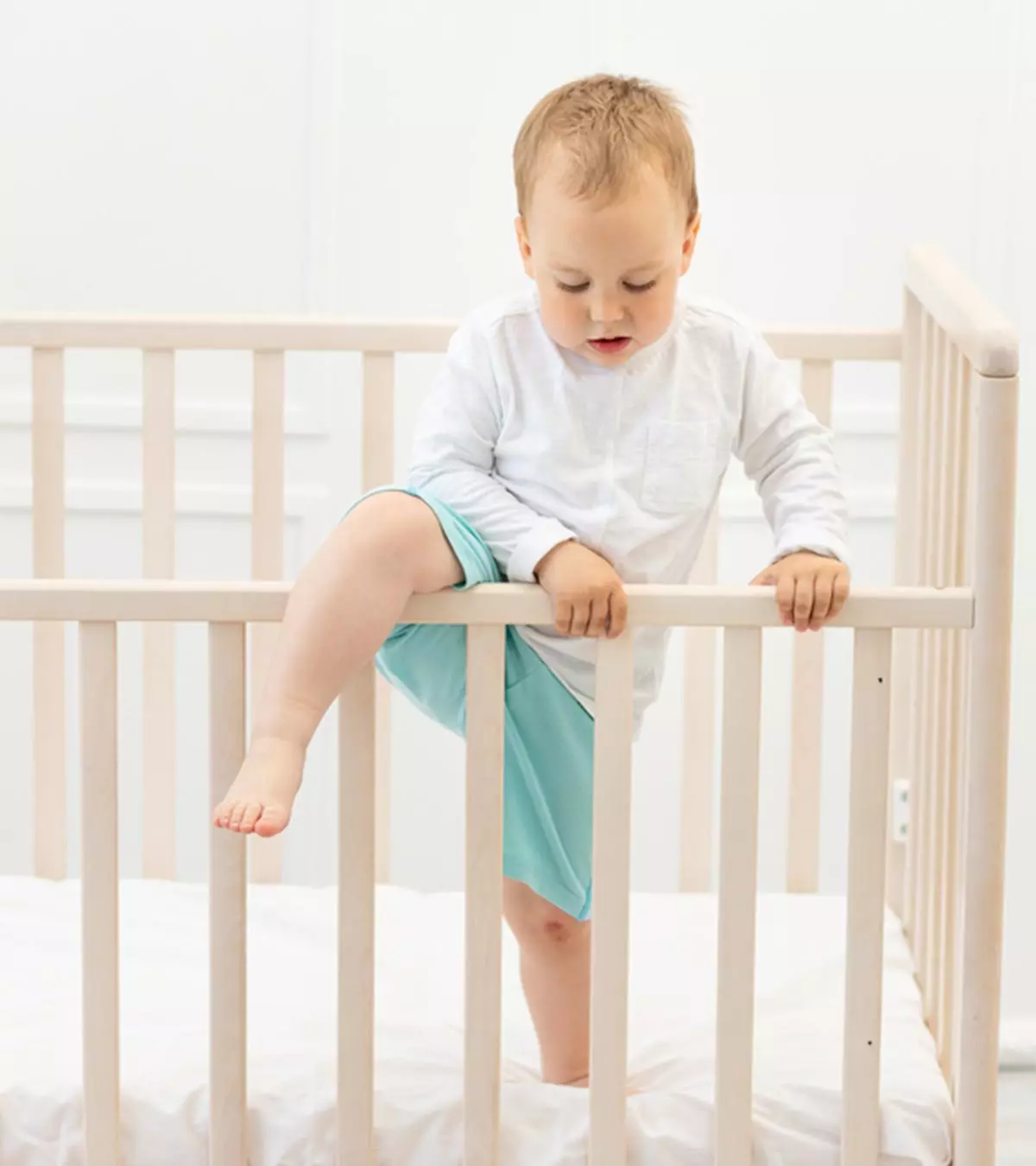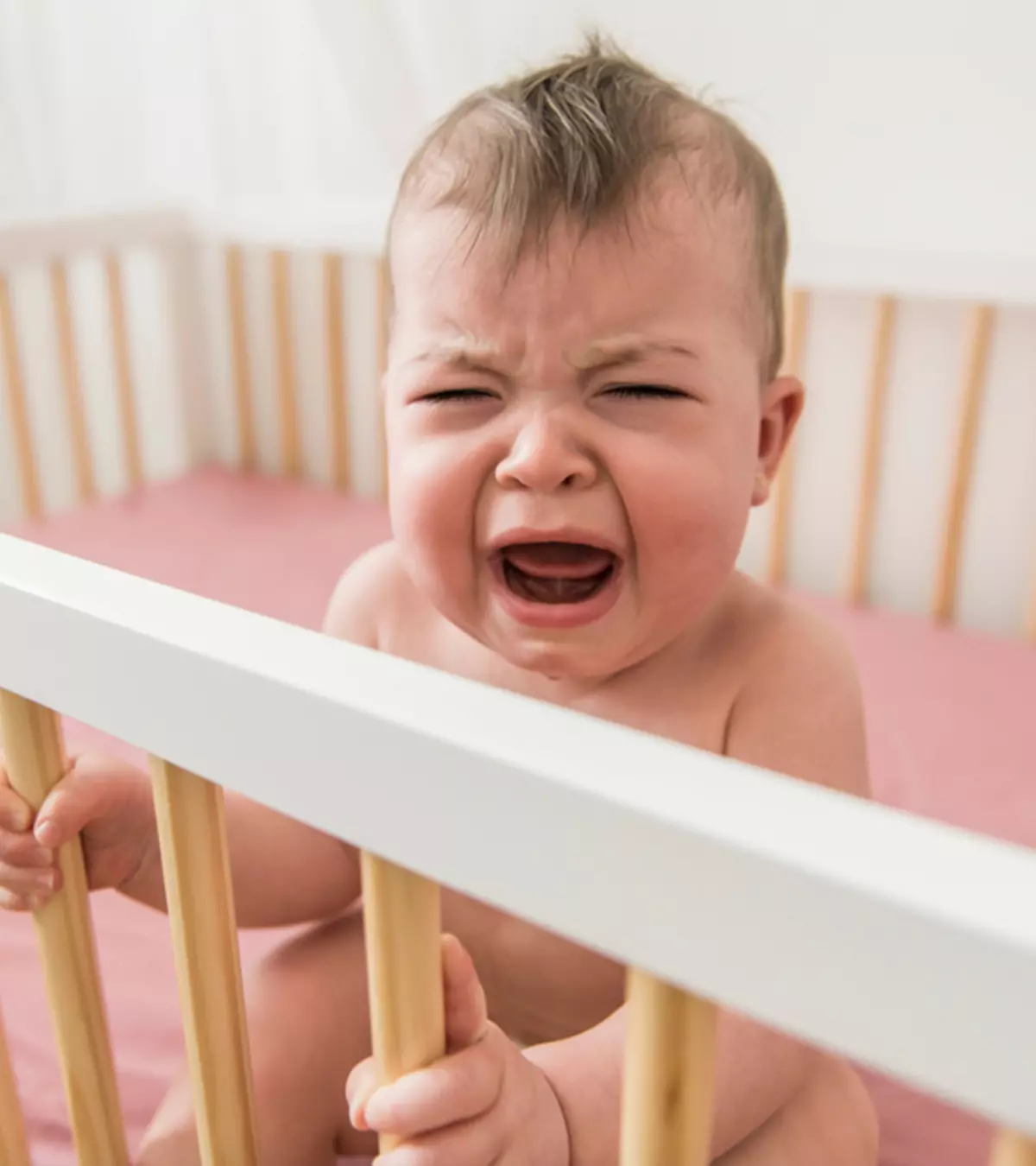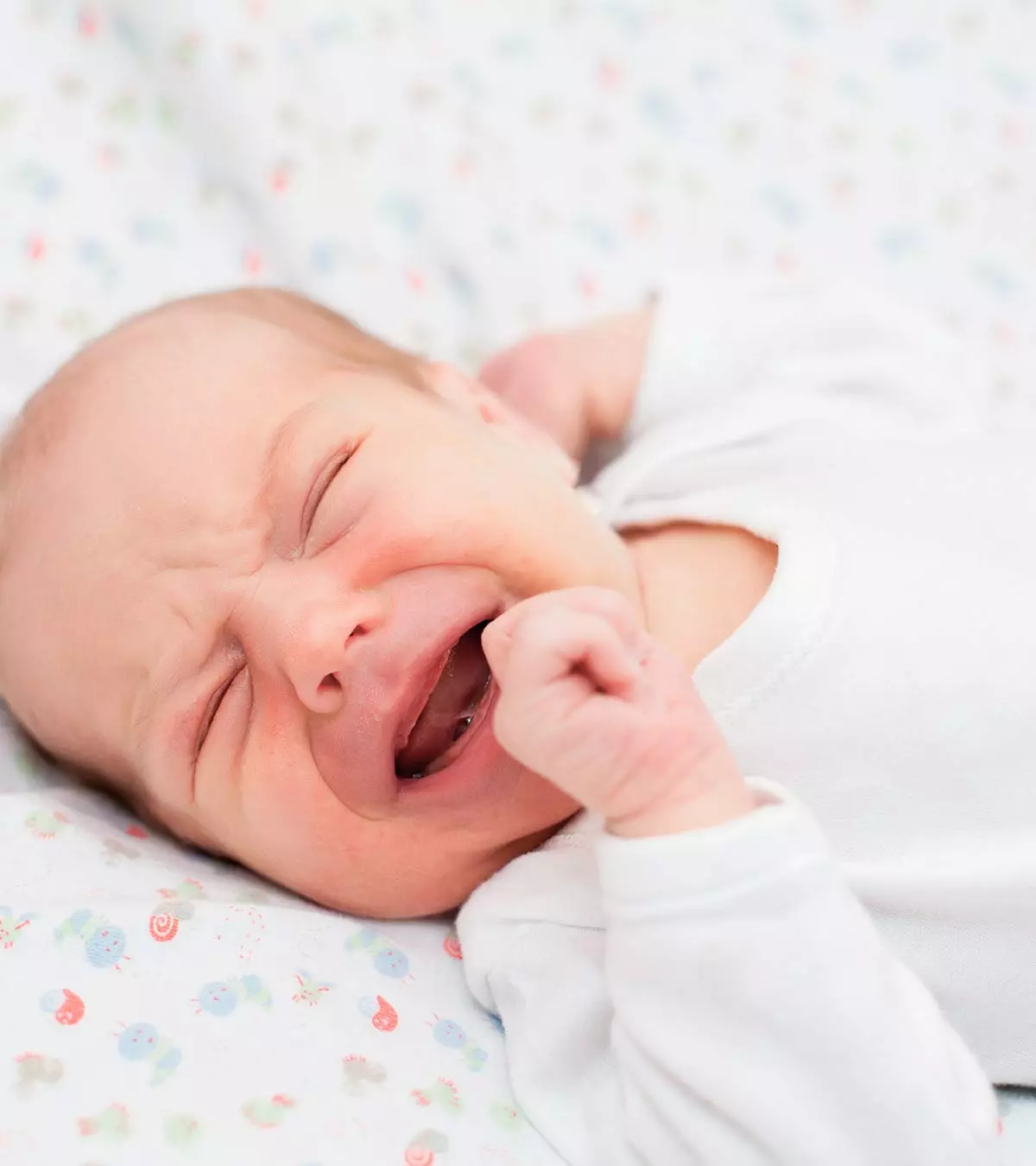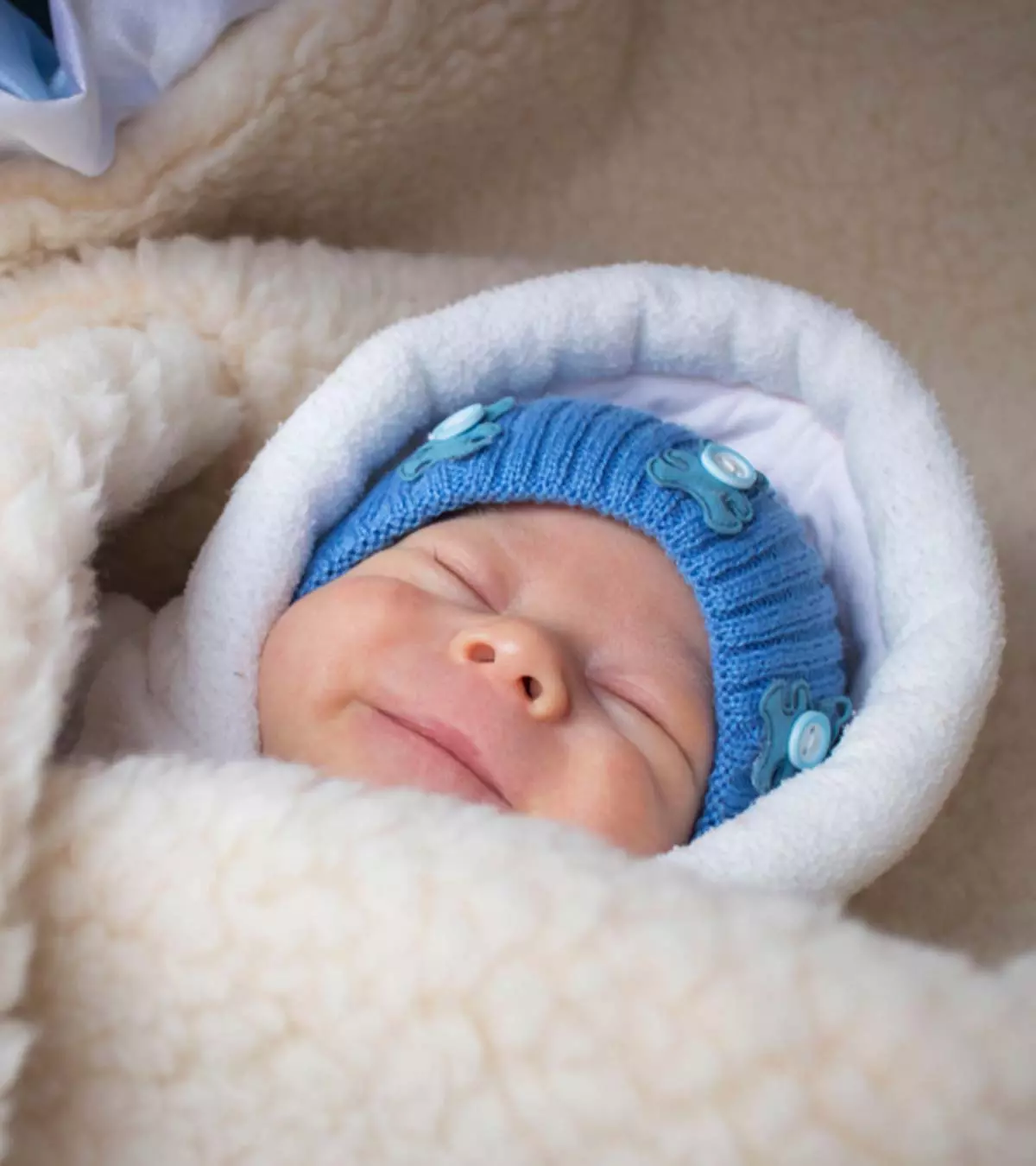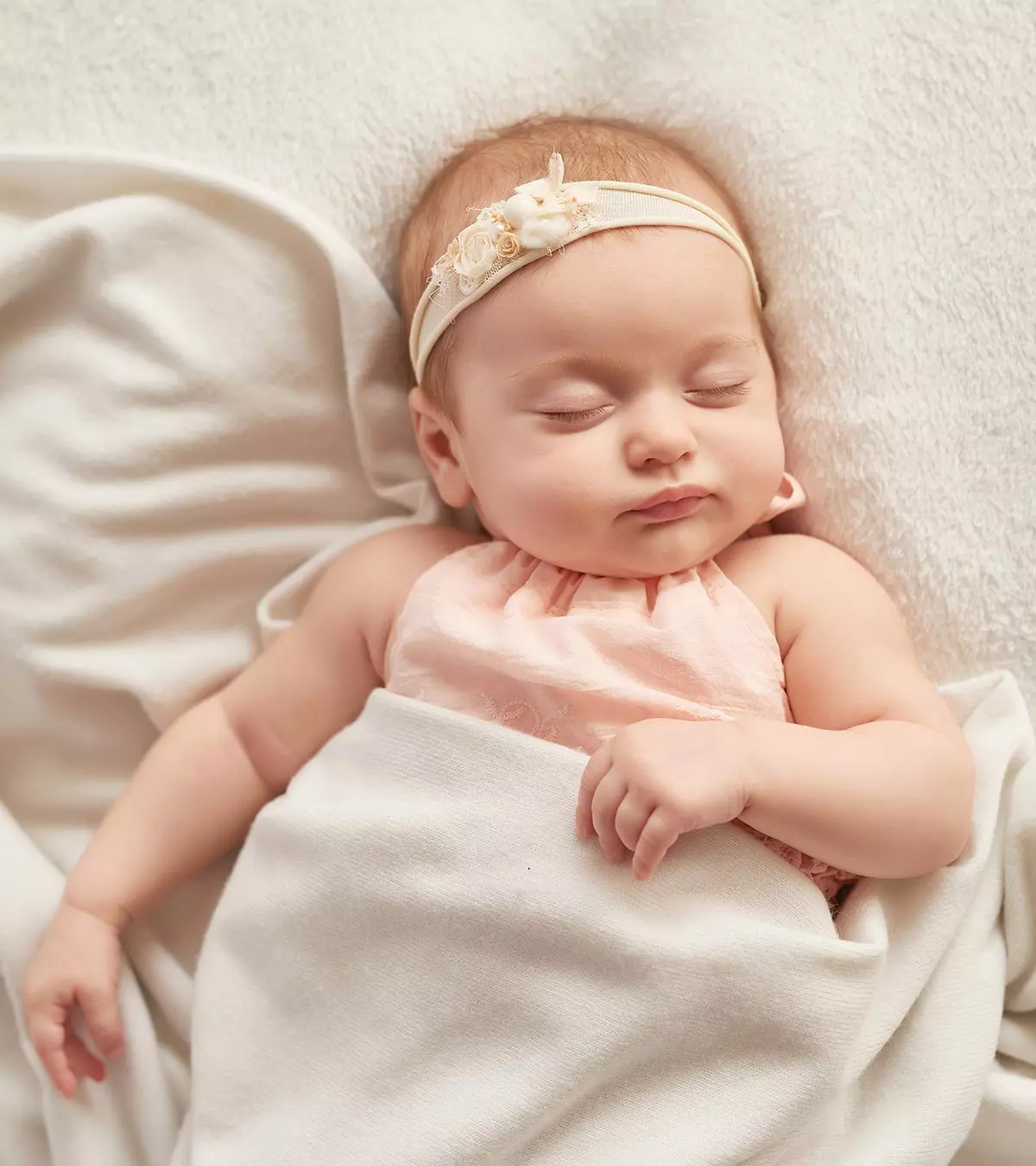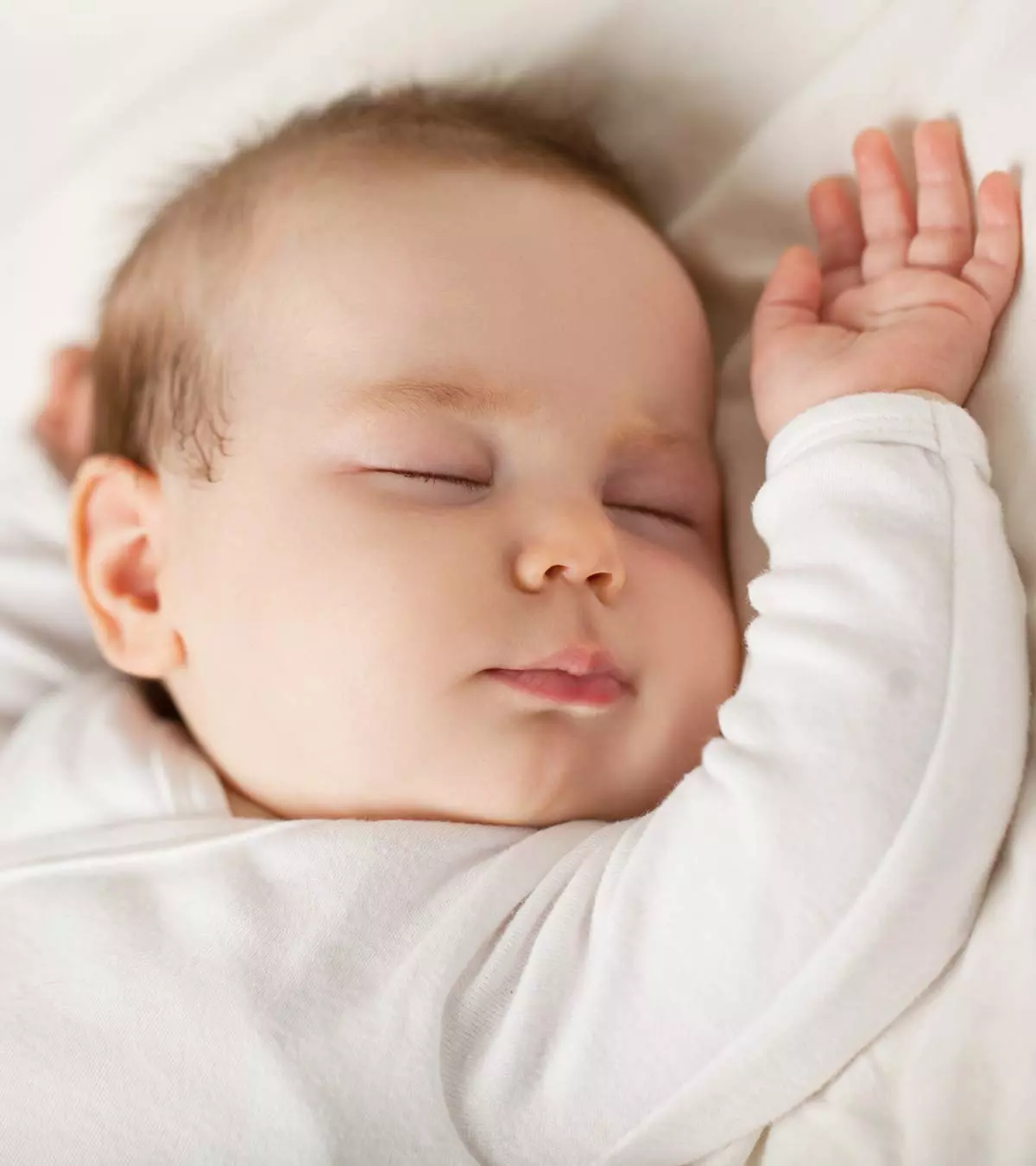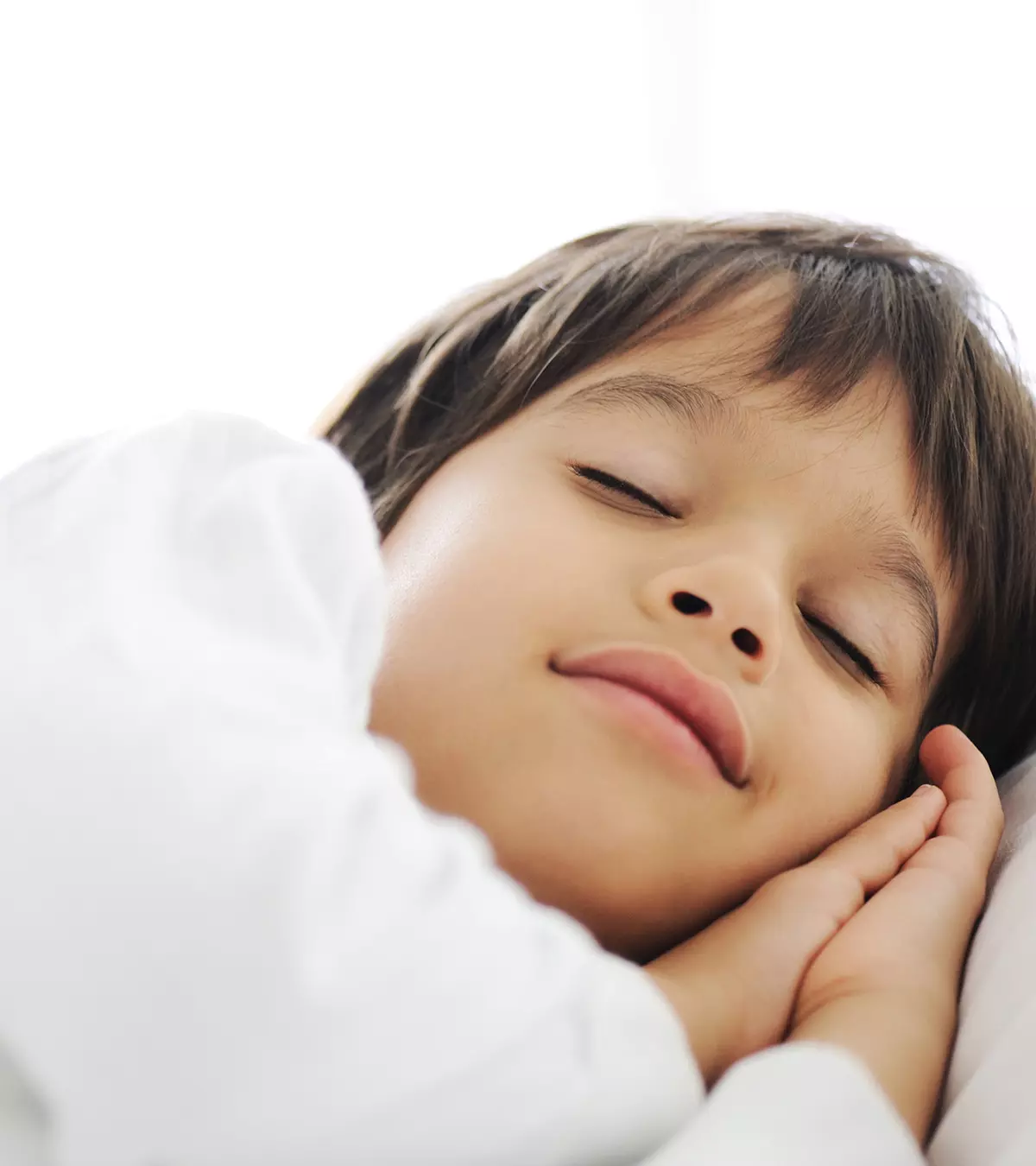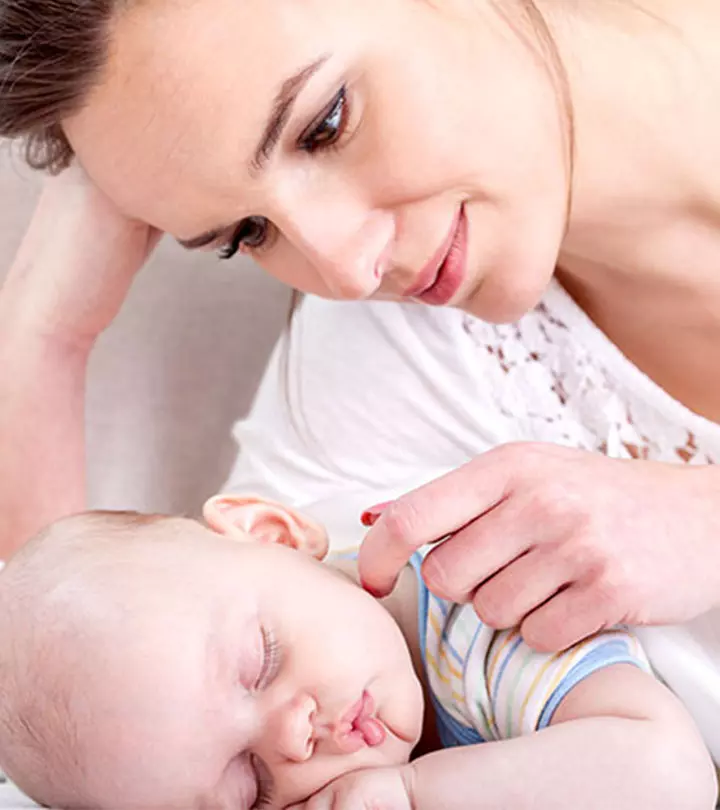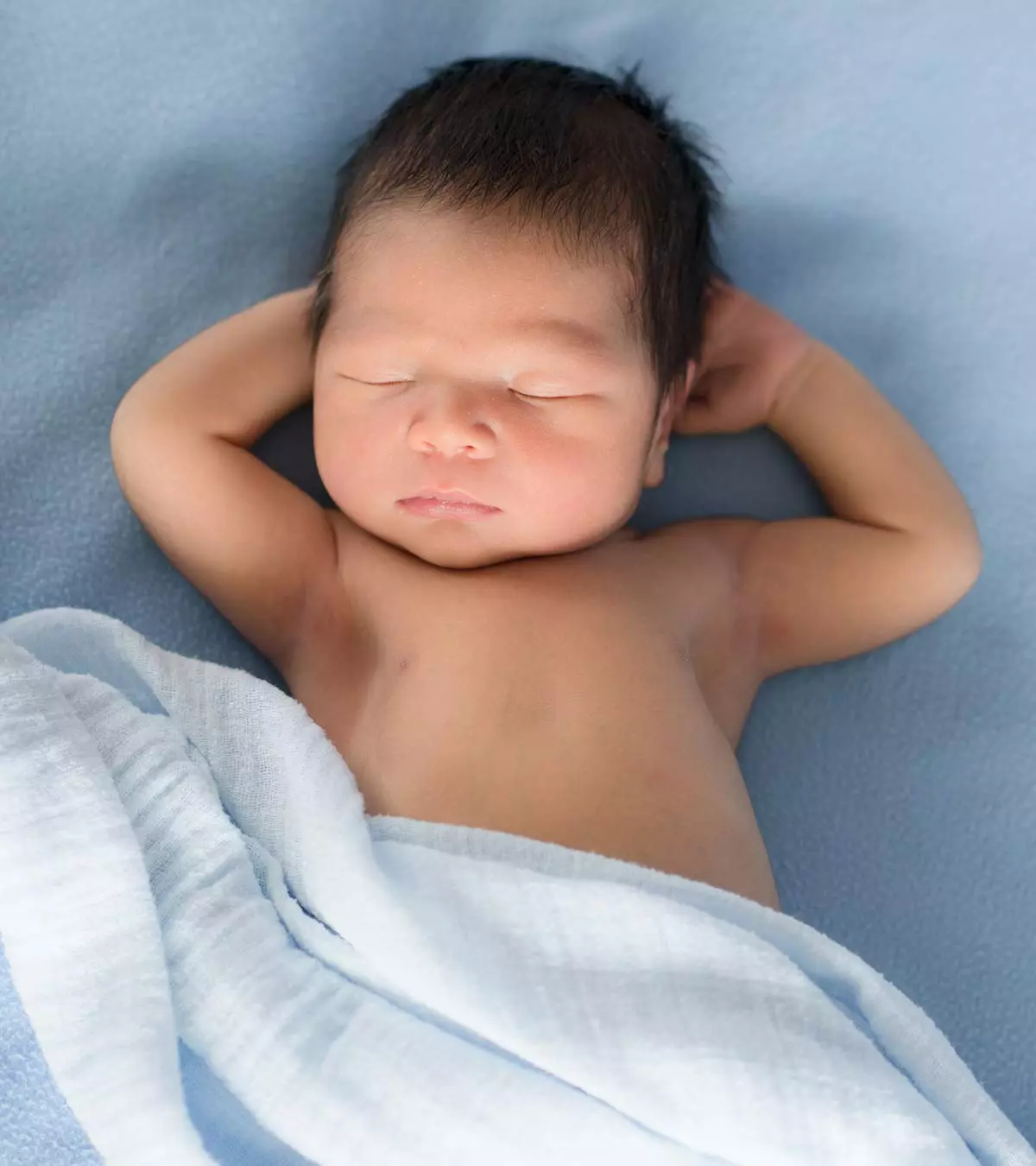
Image: ShutterStock
Night sweats are defined as drenching sweats that require you to change your bedclothes (1). Excessive sweating in babies can cause restlessness and disrupt their sleep. Although it might worry you to see your baby sweating in sleep, it’s not always a sign of a medical condition.

Read this post to learn about the causes and treatment for babies sweating at night and know when to consult a doctor.
Key Pointers
- Night sweats in babies refer to excessive sweating during sleep that requires a change of bedclothes.
- Causes of night sweats may include crying, high room temperature, and deep sleep, which are often not concerning.
- Medical conditions such as fever, medicines, infant sleep apnea, hyperhidrosis, and congenital heart disease can also cause night sweats in babies.
- Adjusting the room temperature and using comfortable clothing can help reduce night sweats in babies.
- If a baby continues to sweat excessively or experiences sudden heavy sweating, it is important to consult a pediatrician.
Is Night Sweat In Babies Normal?
Nighttime sweating is not always a cause for concern. Various reasons cause nocturnal sweatingiExcessive sweating or perspiration during sleep , and not all of them indicate a problem. Consult a pediatrician in the case of sudden onset of heavy sweating that continues for a prolonged period and is accompanied by other symptoms of an illness.
Po-Chang Hsu, MD, MS, a Greater Boston-based medical expert, explains, “Night sweats are typically divided into primary (regular sweating that happens during deep sleep or when it’s warm in the room) and secondary (sweating caused by health issues such as fever).”
Why Do Babies Sweat While Sleeping?
Baby sweating in sleep is not uncommon, and there are several reasons why it might occur during the night. The following are a few reasons that might cause sweating in babies at night.
- Crying: Excess crying can make a baby tired and exhausted, and it might lead to sweating. This type of perspiration usually subsides once the baby stops crying.

- Position: Very young babies cannot move by themselves and might be in the same position for a few hours. In such a scenario, the baby might feel warm and sweat more.
 Quick tip
Quick tip- High room temperature: High room temperature, humidity, and poor ventilation might cause discomfort to the babies, and they might sweat. Sweating is a natural defense mechanism of the body against overheating. The combination of sweating with red skin might indicate overheating of the body (2).
Studies highlight the potential risks of high temperatures for infants. American Academy of Pediatrics found that a 5.6°C (10°F) higher daily temperature during summer was associated with an 8.6% rise in the risk of Sudden Infant Death Syndrome (SIDS). This emphasizes the importance of maintaining a comfortable room temperature and preventing overheating to ensure the baby’s safety and comfort (3). - Too many layers of clothes: Wearing too many layers of clothes or covering the baby with layers of blankets might cause increased body temperature and subsequent sweating. Getting too hot has been linked with sudden infant death syndrome (SIDSiAn abbreviation for sudden infant death syndrome, describing the death of a healthy baby during sleep without any apparent reason ) or sudden unexpected death in an infant (SUDI) (4). It is suggested to dress the baby according to the weather and not overdress.
- Deep sleep: Babies often sweat in the phase of deep sleep sweat. It is usually not a cause of concern.
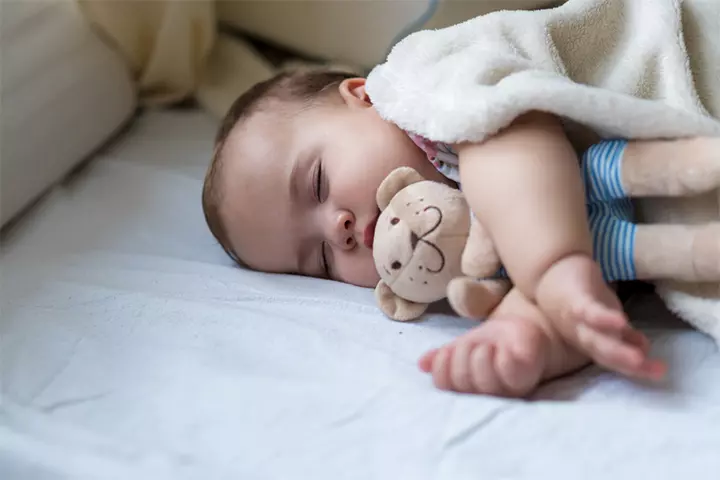
- Location of sweat glands: It is common to see sweating on the baby’s head while they are asleep. Unlike adults, babies have most of their sweat glands located on their heads. The sweat glands develop first on the scalp and then the forehead. Sweat glands of palms, soles, and armpits develop later. Hence, babies tend to have droplets of sweat on the forehead and scalp (5).
- Fever: Babies with fever often exhibit sweating at night. They might develop a fever during an episode of cold or infection (6).
- Medicines: Medicines like acetaminophen that are given to babies to reduce the fever, might also cause sweating.

- Infant sleep apnea: Obstructive sleep apneaiA condition that causes irregular breathing patterns during sleep is seen in one to three percent of children. Symptoms include snoring, difficulty in breathing during sleep, or mouth-breathing during sleep. Sweating is often seen in babies with sleep apnea (7).
- Hyperhidrosis: Hyperhidrosis is a condition characterized by excessive sweating. The exact cause of hyperhidrosis has not been identified, and the condition might be localized to a part of the body (8).
- Congenital heart disease(CHD)iA range of diseases that affect the normal functioning of the heart : Sweating often increases in babies with CHD, especially those with a higher tendency towards congenital heart failure(CHF) (9). Sweating and excessive crying are one of the first symptoms of babies with CHF (10).
- Hyperthyroidism: Hyperthyroidism is an endocrine disorder where an overactive thyroid gland increases thyroid hormone production in the body. As the thyroid hormone plays a vital role in regulating metabolism and temperature, its overproduction may cause physiological changes, such as increased heart rate and perspiration. Other symptoms that a baby with hypothyroidism may exhibit include irritability, bulging eyes, and sleep disturbances (11). Excessive hormone production in babies can also lead to developmental delays.
 Quick fact
Quick factDiscuss with your doctor if you have any doubts regarding the excess sweating in your baby. Observing the baby’s sweating pattern and making some changes might help in bringing down the amount of sweat.
Tips To Deal With Baby’s Sweating While Sleeping
Bringing a few changes to the baby’s surroundings might help in reducing night sweats in babies.
- Room temperature: It is recommended to keep the room temperature for babies between 68 to 72°F (20 to 22°C). As part of the research by the Department of Child Health, University of Leicester, the thermal insulation of clothing and bedding (measured as tog value), room temperature, and body temperature of 3-4-month-old babies sleeping in home cots during winter was monitored. The findings revealed that the room temperature was typically 18.4°C when the infants were asleep but decreased by around 4.4°C at night (12).
Most baby monitors report the temperature of the room, or you can buy a room thermometer. The baby’s room temperature should feel between warm and cool and not hot (13). - Comfortable clothing: To deal with sweating, it is important to know how to dress babies for sleep. Dress the baby in comfortable and season-appropriate clothing. Doctors suggest keeping the baby warm like they would be in the womb. Excessive clothing can quickly overheat the baby. Instead, use moisture-wicking fabrics for their sleepwear and bedding to combat unnecessary wetness and keep the baby dry. It will help maintain the baby’s hygiene and enhance their sleeping comfort. Always choose breathable fabric and comfortable clothing. Ensure you do not swaddle the baby too tightly, since it can cause difficulty with regulating the body temperature (13).

- Control crying: Excessive crying can cause sweating. Therefore, it is essential to find and fix the problem that is making the baby cry. It might be hunger, a wet diaper, or a bad dream. Allow your baby to self-soothe and place them back to sleep. Try moving the baby to another spot for sleep, if possible.
- Hydration: Dehydration can also contribute to excessive sweating, as the body tries to regulate its temperature by releasing sweat. So, keep the baby hydrated. It will help compensate for the fluids lost due to sweating.
- Let the baby cool down for a few minutes after their playtime. You may take them out for fresh air or give them a cool bath before putting them to sleep.
- Using a dehumidifier in the baby’s room can help maintain comfortable humidity levels and reduce the chances of sweating in babies (14).
If the baby continues to be sweaty, then they might have a fever. Do not hesitate to consult a pediatrician as the first line of management.
 Quick fact
Quick factWhen To Consult A Doctor For Baby’s Night Sweating?

Making a few changes might usually resolve the sweating problem in babies. However, you should see a doctor soon if the following signs and symptoms occur.
- Your baby has a body temperature higher than 38°C or 100.4°F (15).
- If they snore, gasp for breath, or take long pauses between breathing while sleeping, it might indicate that he/she has obstructive sleep apnea. They might also exhibit difficulty in feeding and signs of anxiety (7).
- The baby is not gaining weight normally, especially when sweating happens while the baby tries to feed.
Frequently Asked Questions
1. At what age do babies start sweating?
Some studies note that newborn babies do not usually sweat for about the first two weeks of life (5). They are born with sweat glands, but the glands are not fully developed yet. The sweating usually begins around the end of two weeks, although it may vary depending on the baby.
2. Is sweating a sign of teething?
No, sweating is not related to teething. Sweating might happen due to fever, and many parents believe that there is an association between fever and teething. However, research studies show that teething and high fever are not related (16).
3. How does wool bedding ease night sweats in babies?
Although not scientifically proven, wool bedding might help regulate a baby’s body temperature. Wool bedding can help ease night sweats in babies as wool is a natural temperature-regulating material. It can help keep your baby warm in cooler temperatures and wick away moisture when it gets warm, providing a comfortable and dry sleeping environment. In addition, wool fibers are naturally hypoallergenic and repel dust mites, making them a good option for babies prone to allergies or skin sensitivities.
Although sweating is a common phenomenon, keep an eye out for any concerning signs and symptoms. If you notice your baby sweating in sleep, ensure that they are hydrated, dress them in comfortable clothing, and adjust the temperature of the room. However, if they show signs of high fever, have trouble breathing, or are not achieving developmental milestones at the right age, it is advised that you consult the doctor or the pediatrician immediately and seek medical care.
Infographic: Tips To Deal With Baby’s Sweating While Sleeping
Babies may sweat while sleeping if it is too hot or due to underlying conditions. This can be uncomfortable for them and interfere with their sleep schedule. So if your baby struggles to sleep due to sweat, we present some ways to minimize the chances or prevent the condition. Read on! Illustration: Momjunction Design Team
Illustration: Causes Of Baby Sweating In Sleep And When To Consult A Doctor

Image: Stable Diffusion/MomJunction Design Team
My baby sweats a lot when sleeping, but no fever. What could be causing this? What should I do to help? Get answers to these questions and more in this video.
References
1. Anthony J. Viera, Michael M. Bond,and Scott W. Yates, Diagnosing Night Sweats; American Family Physician
2. How to dress baby for sleep; Red Nose
3. Moon, Rachel Y., et al.;Evidence Base for 2025 Updated Recommendations for a Safe Infant Sleeping Environment to Reduce the Risk of Sleep-Related Infant Deaths; PEDIATRICS
4. Williams SM, Taylor BJ and Mitchell EA; Sudden infant death syndrome: insulation from bedding and clothing and its effect modifiers. The National Cot Death Study Group.; U.S. National Library of Medicine
5. K. G. FOSTER, E. N. HEY AND G. KATZ, THE RESPONSE OF THE SWEAT GLANDS OF THE NEW-BORN BABY TO THERMAL STIMULI AND TO INTRADERMAL ACETYLCHOLINE; The Journal of Physiology
6. Lawrence Dall and James F. Stanford, Fever, Chills, and Night Sweats; U.S. National Library of Medicine
7. C. CAROLYN THIEDKE, Sleep Disorders and Sleep Problems in Childhood; American Family Physician
8. Hyperhidrosis; Cleveland Clinic
9. Blanche P. Alter, Emily E. Czapek and Richard D. Rowe, SWEATING IN CONGENITAL HEART DISEASE, Official Journal Of The American Academy Of Pediatrics
10. Mukti Sharma et al, Congestive Heart Failure in Infants and Children, U.S. National Library of Medicine
11. Hyperthyroidism and Graves’ Disease; Nemours Kids Health
12. Wailoo, M P et al.; The thermal environment in which 3-4 month old infants sleep at home; Archives of disease in childhood
13. Dressing babies for bed; Raising Children Network
14. Humidity and Sleep; Sleep Foundation
15. EgidioBarbi et al, Fever in Children: Pearls and Pitfalls; U.S. National Library of Medicine
16. Teething; Seattle Children’s Hospital
17. Helping Babies Sleep Safely; CDC
18. When your baby or infant has a fever; Medline Plus
Community Experiences
Join the conversation and become a part of our nurturing community! Share your stories, experiences, and insights to connect with fellow parents.
Read full bio of Dr. Elna Gibson

Dr. Po-Chang Hsu is a medical doctor and medical content expert. He received his medical degree from Tufts University School of Medicine in Boston in 2016. Previously, he did a master’s degree at Harvard University and wrote a thesis on neuroimaging in schizophrenia patients at Brigham and Women’s Hospital. He currently works at Alpas Wellness.
Dr. Po-Chang Hsu is a medical doctor and medical content expert. He received his medical degree from Tufts University School of Medicine in Boston in 2016. Previously, he did a master’s degree at Harvard University and wrote a thesis on neuroimaging in schizophrenia patients at Brigham and Women’s Hospital. He currently works at Alpas Wellness.
Read full bio of Dr. Ritika Shah
Read full bio of Rohit Garoo
Read full bio of Shinta Liz Sunny





